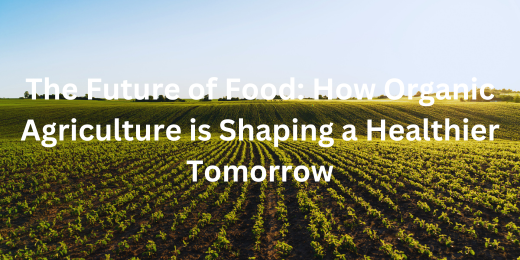
The Future of Food: How Organic Agriculture is Shaping a Healthier Tomorrow
Future of food
Introduction to Organic Agriculture
Organic agriculture is a holistic farming system focused on natural growth, biodiversity, and ecosystem health. It prohibits synthetic chemicals, promoting sustainable soil management and pest control through organic practices. Rooted in ancient methods, organic farming has long been practised in South India, aligning closely with local, traditional techniques.
As people look for healthier, more environmentally friendly food options, the popularity of organic agriculture has grown significantly on a global scale. This trend reflects the future of food as more individuals prefer natural and unprocessed products. Choosing organic methods supports environmental balance and sustainable production, benefitting both consumers and farmers.
The future of organic farming promises innovative growth, contributing to food security and environmental stability worldwide. Adopting these practices fosters biodiversity, reduces pollution, and encourages sustainable livelihoods. Ultimately, organic methods offer long-term advantages, marking the many organic agriculture benefits that contribute to a healthier planet and population.
Environmental Benefits of Organic Farming
Organic farming significantly reduces chemical runoff, protecting water sources and surrounding ecosystems from pollution. This approach minimises soil degradation by avoiding harmful synthetic inputs, maintaining its natural fertility. Such practices contribute to organic agriculture benefits that support a cleaner, healthier environment for future generations.
By preserving biodiversity, organic farming encourages a balanced ecosystem where beneficial species thrive. Sustainable methods reduce disruption to natural habitats, maintaining ecological health over time. The future of organic farming promises enhanced biodiversity, promoting a stable environment and supporting resilient agricultural landscapes.
Sustainable soil management in organic farming enhances soil health, ensuring long-term agricultural productivity. Organic techniques improve soil structure and nutrient content, fostering robust plant growth. These methods represent the future of food production, where environmental well-being and food security are prioritised for sustainable development.
Health Benefits of Organic Produce
Produce grown organically has much lower pesticide concentrations, resulting in a safer option. Reduced chemical exposure protects consumers from harmful toxins, contributing to better overall health. Choosing organic products delivers organic agriculture benefits by promoting a healthier, chemical-free diet for families and individuals.
Organic fruits and vegetables are often richer in essential nutrients than conventionally grown alternatives. These nutrient-dense foods provide vitamins, minerals, and antioxidants that support immune health and vitality. This nutritional advantage highlights the future of food focused on quality, where organic choices elevate health and wellness.
Consuming organic produce can positively impact public health by reducing chronic disease risks. Minimising exposure to harmful chemicals supports long-term wellness and fewer health complications. Such benefits are central to the future of organic farming, addressing health concerns and creating a healthier population.
Economic Impact on Local Communities
Sustainable farming practices drive job creation, offering stable employment opportunities in rural communities. This approach strengthens local economies by empowering farmers to use environmentally-friendly techniques. Through these initiatives, communities experience organic agriculture benefits that support long-term economic growth and provide reliable livelihoods for local families.
Farmer cooperatives play a significant role in supporting economic resilience through organic farming. By pooling resources, farmers can meet growing consumer demand and sustain their businesses. Such cooperative efforts enhance the future of organic farming by fostering collective strength and financial security among local farmers.
In South India, rising demand for organic products contributes to expanding local markets. This increasing popularity of organic produce helps farmers reach broader audiences and secure better prices. Supporting organic farming bolsters the future of food by making sustainable products accessible and beneficial for communities.
Challenges Facing Organic Agriculture
Certification and standardisation processes present unique opportunities for enhancing quality within organic agriculture. These standards ensure consumer trust, promoting the organic agriculture benefits that drive market growth. Establishing clear guidelines also empowers farmers to maintain authenticity, improving product quality across organic farming practices.
Access to resources and knowledge equips farmers to adopt innovative organic practices that enhance productivity. Training and educational initiatives make the future of organic farming accessible to communities worldwide. With the right support, local farmers can achieve sustainability, benefiting both their businesses and the environment.
While market competition with conventional agriculture remains a challenge, it fuels growth within the organic sector. This competitive landscape encourages organic farmers to innovate, contributing to the future of food. Such efforts lead to more efficient farming methods that increase productivity and expand organic agriculture’s global reach.
A Greener Future – Cultivating a Healthier Planet
Innovations in organic agriculture are transforming farming practices, enabling farmers to achieve higher yields sustainably. Advanced technologies like precision farming and eco-friendly pest control contribute significantly to organic agriculture benefits. These tools help farmers maintain soil health and improve crop quality, promoting sustainable development in the agricultural sector.
Supportive government policies are boosting organic farming initiatives, providing resources and subsidies to local farmers. These initiatives make the future of organic farming more accessible, fostering environmentally responsible growth. By empowering farmers, governments contribute to a strong, sustainable agricultural economy in South India.
Community involvement and consumer awareness campaigns encourage people to choose organic, supporting local farmers and healthier lifestyles. Increased awareness about organic farming is shaping the future of food, with consumers demanding more organic products. This demand inspires farmers to adopt eco-friendly practices, benefiting communities and the environment alike.
Explore an extensive range of Uyir Organic food products and eco-friendly fertilisers by visiting your nearest Uyir Organic Farmers Market, or conveniently shop online at www.uyironline.in or www.uyirorganic.farm.